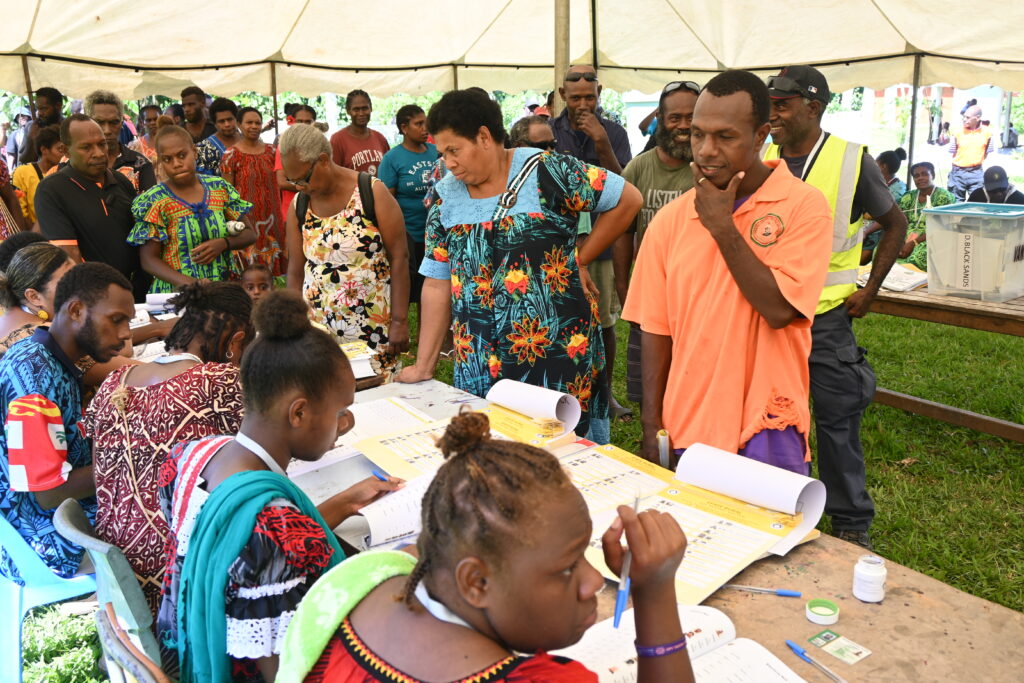As the wait continues for official results in the Vanuatu elections, one outcome is clear: women will be severely under-represented in the next parliament.
Vanuatu is an outlier even in the Pacific, the region that elects fewer women than any other.
Just six women have been elected to the 52-seat parliament since independence in 1980, and just one in the past 15 years: Gloria Julia King.
Ms King earned the support of voters in the Efate constituency in 2022, and is running again in this year’s snap election.
Speaking in the village of Mele, north of Port Vila, after casting her vote, she told AAP she was feeling “a lot more relaxed” second time around.
“In 2022 it was just a lack of knowledge with the whole political process of campaigns. I was a bit overwhelmed. This time I’ve grasped it a little bit better,” she said.
The factors behind the male-dominated parliament are multi-faceted, but tackled in a recent report by Pacific women’s advocacy group Balance Of Power, titled ‘Unspoken Rules of Politics‘.
Funding a run for office can be harder, with fewer women enjoying financial independence, producing fewer candidates.
There are just seven women among the 217 candidates in this year’s poll.
The electoral system – a single non-transferable vote, electing multiple members in constituencies – heavily favours incumbents, who are almost wholly men.
Voting in Vanuatu is also subject to intense community pressures, particularly to support incumbent MPs who are seen as delivering for their communities.

That occurs through the shady use of constituency funds: public money given directly to each MP to spend in their electorate, which often indirectly or directly buys votes.
Ms King said a lot of her effort in this campaign was aimed at freeing women of these pressures to think and vote independently.
“My primary goal was just to get more women to vote, and get them to understand their democratic power enhances the whole voting process,” she said.
“For a long time, I knew that women were intimidated by men when it comes to voting, so we had to change the campaign messages to make them more approachable, educational, empowering.”
The Balance Of Power report found men believed female MPs might be controlled by their husband, while women – drawing on their own experiences – also felt they may not be able to act autonomously.
ANU Pacific Affairs fellow Kerryn Baker said research showed men supported greater representation, but held unflattering perceptions.
“There’s strong in-principle support (to elect more women) but then when you ask, ‘are men are better at political leadership than women?, a majority agree,” she said.
Ni-Vanuatu are also cautious of external powers – including Australia, which has made gender equality a priority of its development partnership – tilting the scales in favour of women.
“There is an awkwardness around efforts to get more gender representation in parliament, it can be seen as outside interference,” Dr Baker said.
Dr Baker said that women arguing for women to be elected, such as Ms King, can also be seen as “self-interested or self-serving”.
“It’s a lot harder for women to generate the political capital to make change in this space and women politicians, of course, must endure the double burden of representing both their constituencies and ‘women’ as a broad social group,” she said.
Ms King, who expressed delight the campaign was over after an exhausting effort, agreed with that sentiment.
“The last legislative was very dominated by men and everyone wanted me to get up and speak all the time,” she said.
She is confident her work will pay off at the polls.
“I’ve done the work, done the yards, I’ve done the sacrifices,” she said.
“I have a lot of faith in the women of Vanuatu. This has been my message for the last two years: if you want women to be represented, you have to vote for the women.”
Written By: Ben McKay © AAP 2025


Comments are closed.